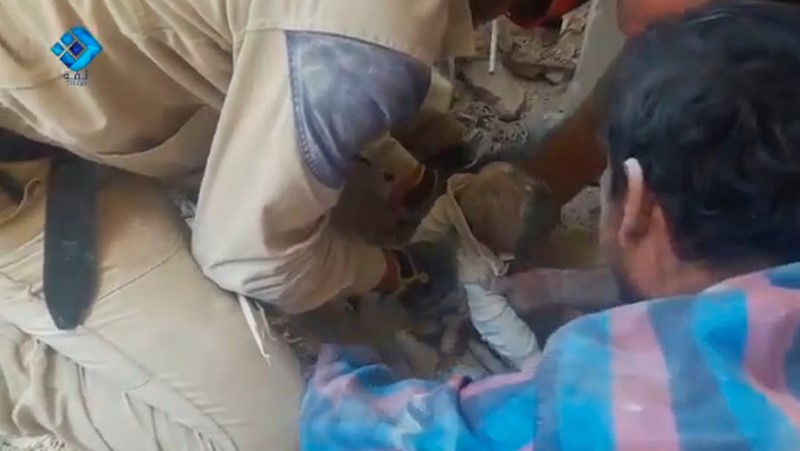By Ellen Francis and Tom Perry
BEIRUT (Reuters) - Warplanes bombed Aleppo on Friday with what residents described as unprecedented ferocity after the Russian-backed Syrian army announced an offensive to fully capture Syria's biggest city, killing off any hope of reviving a ceasefire.
Video images filmed by residents showed a young girl screaming as rescuers frantically dug her out of rubble, pulling her out alive. Another showed rescuers digging out a toddler with their bare hands, shouting "God is Great" as they lifted him from the debris. The boy showed no signs of life as he was rushed off in a rescuer's arms.
The apparent collapse of U.S.-backed peacemaking may mark a turning point in the 5-1/2-year-old war, with the government and its Russian and Iranian allies now seemingly determined to crush the rebellion in its biggest urban stronghold.
"Can you hear it? The neighbourhood is getting hit right now by missiles. We can hear the planes right now," Mohammad Abu Rajab, a radiologist, told Reuters. "The planes are not leaving the sky, helicopters, barrel bombs, warplanes."
Hamza al-Khatib, head of a hospital in rebel-held eastern Aleppo, said that 91 people had been killed in Friday's bombardment while the Civil Defence rescue group that operates in opposition areas said 40 buildings were destroyed. The Syrian Observatory for Human Rights monitoring body gave an initial death toll of 27.
Ammar al Selmo, the head of Civil Defence, said the rescuers themselves were targeted, with three of their four centres in Aleppo hit.
"What's happening now is annihilation in every sense of the word," he told Reuters. "Today the bombardment is more violent, with a larger number of planes."
Water has been cut off to nearly two million people in Aleppo as a result of the attacks on Thursday and Friday, the U.N. children's agency UNICEF said.
The Syrian army announced overnight that it was launching an operation to recapture the rebel-held sector of the city. On Friday a Syrian military source denied the army was targeting civilians, saying it was accurately targeting "terrorist positions" in Aleppo.
Western diplomats fear a bloodbath if the government unleashes a full-blown assault to capture the besieged opposition-held zone, where 250,000 civilians still are trapped.
"The only way to take eastern Aleppo is by such a monstrous atrocity that it would resonate for generations. It would be the stuff of history," one Western diplomat said.
The assault left no doubt that the government of President Bashar al-Assad and its Russian allies had spurned a plea from U.S. Secretary of State John Kerry to halt flights to resurrect the ceasefire, which collapsed on Monday after a week.
At the United Nations, diplomatic efforts to revive the truce made no tangible progress.
"My fear is that the bombings of the last few hours in Aleppo show that the regime is actually playing the card of partitioning Syria and its backers are letting it happen," French Foreign Minister Jean-Marc Ayraud told reporters.
Recovering full control of the rebels' last significant urban area would be the most important victory of the war so far for Assad, strengthening his control over Syria's most populous and strategically important regions.
COMPREHENSIVE OFFENSIVE
In its late-night announcement on Thursday, the Syrian military announced "the start of its operations in the eastern districts of Aleppo". It warned residents to stay away from "the headquarters and positions of the armed terrorist gangs".
An army source said on Friday that the offensive would be "comprehensive", with a ground assault following air and artillery bombardment. "With respect to the air or artillery strikes, they may continue for some time," he said.
Several residents said explosions had struck with far greater force than anything that had hit the city in the past, making bigger craters and bringing entire buildings down.
"I woke up to a powerful earthquake though I was in a place far away from where the missile landed," said a rebel commander in a voice recording sent to Reuters. His group had "martyrs under the rubble" in three locations.
The offensive coincided with international meetings on Syria in New York, ostensibly intended to revive the truce announced jointly by the United States and Russia on Sept. 9.
The collapse of the ceasefire - the same fate as that of all previous efforts to halt a war that has killed hundreds of thousands of Syrians - appeared to have doomed the peace bid, probably the last chance for a settlement before U.S. President Barack Obama leaves office in January.
The Syrian government, strengthened by Russian air power and Iranian-backed Shi'ite militias, has been tightening its grip on rebel-held districts of Aleppo this year, and this summer achieved a long-held goal of fully encircling the area.
Syrian state television reported late on Friday that the army had managed to advance and secure control over a road near Ramousah in southwest Aleppo, but this was denied by rebels. They said several attempts by the army to advance had failed.
On Thursday in New York, the United States and Russia failed to agree on how to revive the ceasefire during what U.N. Syria mediator Staffan de Mistura called a "long, painful, difficult and disappointing" meeting.

Kerry said he had made "a little progress" in talks on Friday with Russian Foreign Minister Sergei Lavrov, who cited no progress and accused the United States of failing to honour the latest ceasefire deal.